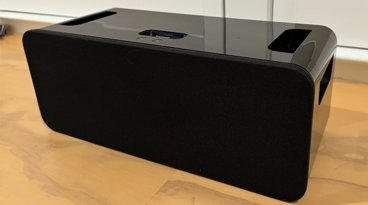Japan disaster causes shortage of lithium ion batteries for Apple
Kureha Corp. was recently contacted by Apple as the company expressed concerns over an apparent tight supply in lithium ion batteries, according to The Wall Street Journal. The report said the batteries are used in Apple's "popular iPods," but made no mention of other devices like the iPhone, iPad, or MacBook line.
Kureha is the maker of a "crucial" polymer known as polyvinylidene fluoride, or PVDF, used in lithium ion batteries that power devices like Apple's iPod lineup. The company has a 70 percent global market share of the polymer, but was forced to close down its factory in Iwaki, Japan, after the deadly earthquake hit on March 11.
As it struggles to meet demand for products from partners like Apple, Kureha is said to be accelerating its previously detailed plans to move its operations overseas. The company has factories in the U.S. and China, but none currently produce PVDF.
Takao Iwasaki, CEO of Kureha, told the Journal that his company was already considering production of PVDF in the U.S. and China in the future. The recent disaster will accelerate those plans, though he hopes to keep research and development in Japan.
About 800 workers are employed at the Iwaki plant that was shut down. Though it is located near the epicenter of the quake, none of the employees were said to have been seriously injured in the disaster.
Soon after the quake struck, concerns arose about Apple's ability to procure components from suppliers in Japan, particularly for the newly released and already constrained iPad 2. Among the parts said to be a concern by iSuppli are the system battery supplied by Apple Japan Inc.
While the iPad 2's three-cell battery is labeled as "assembled in China," the label refers to the whole battery pack. The battery itself is made by Apple Japan, which operates as a subsidiary of Apple. The Journal's story did not say whether Kureha's polymer is used in the iPad 2 battery.
Last week, one Wall Street analyst said checks with "critical" suppliers found that the disaster in Japan has not "meaningfully impacted" the supply of the iPad 2. It was said that any impact to supply would be "modest."
 Sam Oliver
Sam Oliver













 Amber Neely
Amber Neely
 Thomas Sibilly
Thomas Sibilly
 AppleInsider Staff
AppleInsider Staff
 William Gallagher
William Gallagher
 Malcolm Owen
Malcolm Owen
 Christine McKee
Christine McKee









22 Comments
First.
Oh and I like turtles!
You guys are always predicting doom. You said this about other parts, yet there has been no visible effect on iPad 2 production. Stop creating undue panic.
The effects of the disaster have been interesting to watch as they propagate. In fact they propagated right into my facility when we discovered that Sony's only factory for HDCAM and HDCAM SR video tape was in Sendai and was damaged and flooded. There are other small players in the video tape market that can make HDCAM, but the Sendai plant was the only source in the world for the SR tape. It's taking a while for it to reach us, but already you cannot buy SR tape. It's all gone. HDCAM is available but constrained. OTher tapes are getting hard to fine as well.
Noticeable effects on Apple products will probably take some time to appear, but they will. If parts or raw material are no longer being delivered, you can only make your product for so long. Thanks just-in-time inventory!
Of course, this affects every other manufacturer.
If the batteries are for iPods, then they are likely for iPhones as well, assuming that "iPods" includes the Touch.
So going back to other threads here, it could be a reason why the iPhone MAY be delayed.
First.
Oh and I like turtles!
Unfortunately for you, those are the only two things that you've got going for yourself.